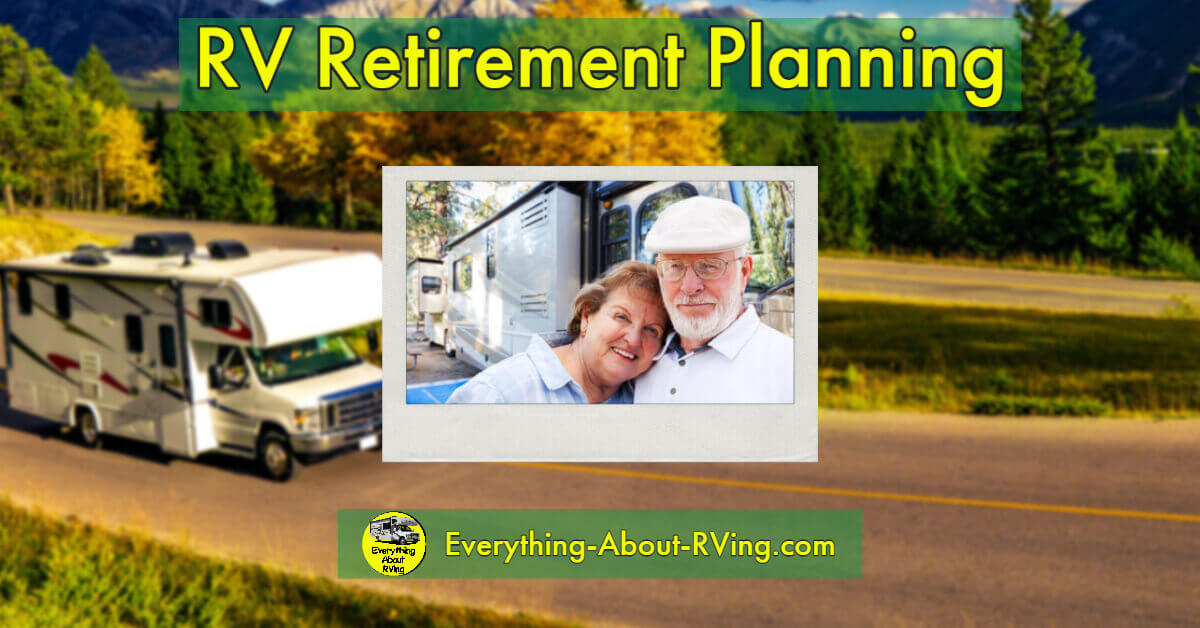- Home Page
- RVing Tips & Tricks
- Rv Retirement Planning
RV Retirement Planning
What
you need to do before retiring to an RV
RV retirement planning will ensure that your retirement
RV Retirement Planning is required to make sure that you consider several logistical realities before transitioning to retiring to an RV. The next chapter of your life is full of possibilities. Retirement is an open road, and you get to determine your route. Setting out in an RV is a popular retirement option. You can see every corner of the United States with time to take in everything from gorgeous mountains to hole-in-the-wall pie shops. Think about visiting family and friends from the comfort of a new home on wheels.
The Right RV
There are many different types of RVs across a wide price range. A spacious Class A RV resembles a tour bus in length and drivability. This is typically the most expensive option and balances usable space with maneuverability challenges. Class C RVs are smaller motorhomes that are generally shorter than Class As. A Class B RV is a camper van that manages to fit essential functions into a compact space. This is an option for retirees that want parking flexibility. Towable RVs come in options like large fifth wheels, travel trailers, and pop-up campers. These require a well-equipped separate vehicle.
Secure Funds
A new Class A RV can cost up to $200,000. Some RV loans require as much as 20% down on the purchase. That's why the RV retirement planning process includes thinking about ways to secure cash for your motorhome or towable RV. You may plan to sell your house or downsize your hometown digs. Homeowners that prefer to hang on to their investment should consider VA cash-out refinance options to use their home’s equity as a source of funding. Budget wisely and make the most of your resources as you choose your RV.
Good Insurance
Whatever RV you choose must be adequately insured on the road. Your auto insurance policy may not be adequate for your plans. RV insurance policies can cover full-time RV living as you travel. Speak with an insurance agent and compare policies. This will vary across RV classes.
Streamline Your Possessions
Think about what you truly want to take with you on the road. This is an excellent time to sort through your accumulated belongings and prioritize your possessions. Consider selling unwanted or large items to help fund your journey. Factor in the cost of secure storage if you plan to keep more than you can take on the road. Roadworthy RVs have weight limits, and streamlining your possessions can reduce the physical and mental load.
Driving Skills
New RVers should be comfortable driving their new home on wheels before hitting the road. Large motorhomes or trailers can present challenges to inexperienced drivers. Consider whether you need instruction to be prepared for all road conditions you will encounter during your travels. Some people may like having a secondary vehicle for quick trips away from their RV parking spot. Safety is paramount to a successful journey.
Maintenance Plan
RV maintenance can be expensive. Research the costs associated with your preferred class of new or pre-owned RV. Setting aside maintenance and emergency funds is wise: schedule inspections and oil changes around your travel plans. Check tires frequently, especially if your journey takes you over gravel and dirt roads. Basic knowledge of easy repairs and indicators of developing issues can help you avoid bigger problems. Proactive maintenance keeps you on track.
An Itinerary
Think about where you want to go and what you want to see. The road less taken may be longer and provide more beautiful views. Plan stops for doing laundry and possible vehicle maintenance at well-reviewed auto shops. Decide whether you want or need to stay at traditional campgrounds. The size of your RV may determine this. Good campgrounds charge a fee for a parking space with reliable electrical, septic, and water hook-ups.
Community Connections
During your RV retirement planning you need to determine how to get connected to the RV community online. You can talk to other RVing retirees on social media or specialized website forums. Watch RV and van-life YouTube videos for real-life tips.
Good Sam members enjoy instant discounts on fuel. Join Today!
Survey your numerous options and make great choices to fuel your exciting RV journey.
Hopefully, this article has helped you in your RV retirement planning. Happy RVing.
Recent Articles
-
Everything About RVing
Everything About RVing will give you Ultimate tips, expert advice, and essential guides for unforgettable adventures on the open road. -
Citation camper
Hi I have a citation camper that I got at a auction with no title I believe the camper is in the 1990's an I live in upstate NY but not sure I have two -
Turkey Salad Sandwiches
EDITOR'S NOTE: This Recipe was submitted on the Favorite Camping Recipes Page Once you have finished diving into this Thanksgiving Leftover Recipe, you -
Eliminating RV Sewage Smell
This story was submitted on our RVing Tips and Tricks Page I'm a professional motorcoach driver. (Tour bus) We do use the blue enzyme packets. Although -
Winegard ConnecT 2 WiFi Extender Review
Does the Winegard ConnecT 2 WiFi Extender really work? Read our Winegard ConnecT 2 WiFi Extender Review to find out what happened when we tested it




